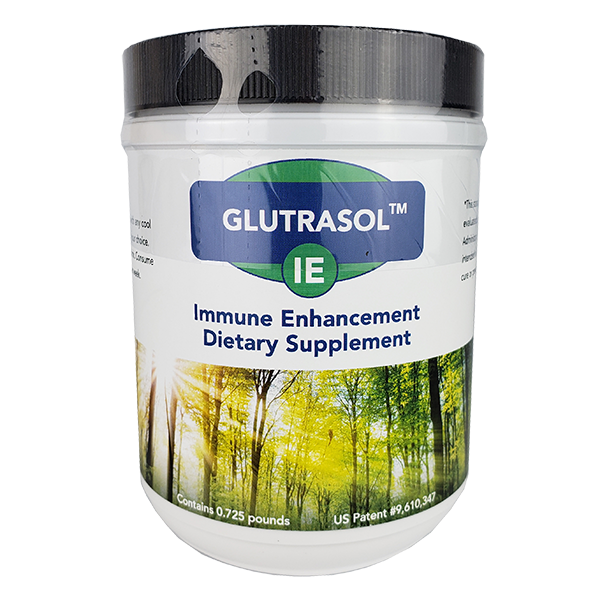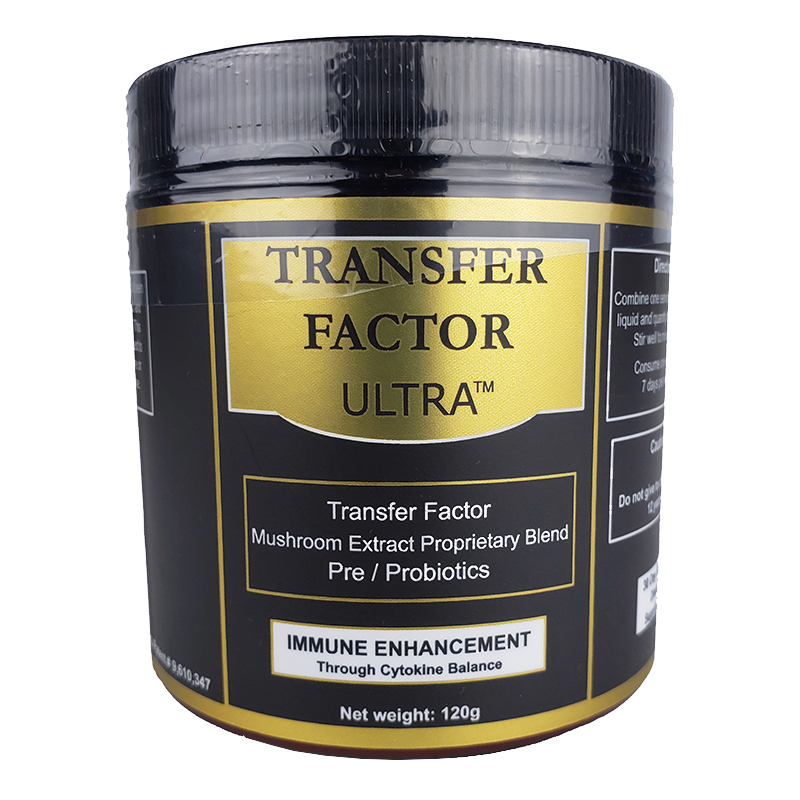
How does Glutrasol Work?
To improve overall health and integrated treatment efficacy, Glutrasol supports the immune system by employing three chemistries key to Glutrasol’s science-based specialty supplement: transfer factor, beta-glucans, and lactic acid-generating bacteria.
Transfer Factor
Transfer factor is commonly derived from colostrum, a cow’s first milk after calf delivery. This milk contains information in the form of small proteins (polypeptides) that transfer immunity from cow to calf or from cow to human.
In Glutrasol, the proteins are separated by molecular weight. Other sources of transfer factors include eggs, sheep, goats, and lysed cells. As various sources are mixed, the scope of immunity typically increases. If people take transfer factors daily, their immune capability—as measured by killer white blood cells—could increase by as much as 250%.

Proteins are separated by molecular weight.
Beta-Glucan
Beta-glucan stimulates the two principal parts of the body’s immune system: the innate and the acquired immune systems.
Innate immune systems
In the innate immune system, beta-glucan binds with the macrophages, a white blood cell that detects bacteria, viruses, and other pathogens to coordinate the body’s defenses against them. When activated by beta-glucan, macrophages have a greater ability to identify and destroy foreign intruders. After devouring pathogens through phagocytosis, the macrophages communicate the intruder’s presence to the body’s other defenders. Research shows that macrophages fortified by beta-glucan can rally the body’s defenses.

Macrophage activation via cell surface receptor.
Acquired immune systems
After this, the acquired immune system joins the fight. With the information transmitted from the macrophages, the acquired immune system learns to manufacture other killer cells and blood factors designed to defend against a specific attack. These include B-cells, which produce antibodies. The antibodies, working with the innate immune system, destroy foreigners and bind them into clusters. Macrophages then overwhelm these. This process is how the body rids itself of infection and disease.

Lactic Acid-Generating Bacteria.
Lactic Acid-Generating Bacteria
Many assume that glucose is the primary energy source for living tissues, but there are indications that neurons in the human brain preferentially metabolize lactate, not glucose.
Digestive Health
Lactic acid-generating bacteria also have significant positive effects on digestive health. Foods such as cod liver oil and sauerkraut, for example, derive their benefit from lactic acid-generating bacteria. The liver, pancreas, and kidneys are less stressed with good digestion.
The immune system is supported because beneficial lactic acid-generating bacteria displace pathogens in the digestive tract, restoring healthy mucus in the intestinal lining.
Supporting Immune Health
—Richard Bennet, Ph.D.
The Challenge
The global need to address immunodeficiency disorders is real and immediate. Richard Bennet, Ph.D., states, “Our ability to create a really healthy immune system represents the greatest potential gains in health in the world.”
Immune System Health
The outcomes resulting from diminished immune system health are broad. Compromised immune health affects the ability to fight off pathogens, leaving at-risk populations, especially the elderly or 3rd world populations, at a deficit in avoiding disease.
At-Risk Populations
Seniors
Many seniors are at risk of contracting disease due to physical limitations, existing health concerns, or nutritional deficits. Providing a robust immune health foundation can effectively arm seniors with a better ability to maintain good health and vitality.
Developing Countries
In many developing countries, vast numbers of at-risk populations arrive at support organizations with immune systems that are severely compromised, either from inadequate nutrition, poor sanitation, environmental stress, or aging. Poor sanitation, nutritional food, and environmental distress are common and systemically complex to overcome.
One solution to support these at-risk groups is providing nutraceuticals or specialty supplements like Glutrasol to help these at-risk populations improve their immune system health.

Developing countries are located mainly in Africa, Asia, Latin America, and the Middle East.
Infectious disease epidemics cost the world US$60 billion each year. They match wars and natural disasters in their capacity to endanger lives, disrupt societies, and damage economies.
— Coalition for Epidemic Preparedness Innovations (CEPI)
Immune-System Health and Antigen Exposure
Immune system health is an important factor in fighting disease
Fighting Disease
Immune system health is an important factor in fighting disease. Dr. Ananya Mandal, MD, notes that “the reason for non-development of immunity to a disease could also be that the host’s immune system does not have a B cell capable of generating antibodies against the antigen or microbe or the immune system may not be strong enough to fight off the infection.”
Kenneth L. Marcella, DVM, states, “It is the immune system, after all, which allows humans and animals to recognize and remember potentially harmful foreign substances such as bacteria and viruses. The immune system allows us to respond to these threatening invaders in our systems.”
CortControl’s Glutrasol helps build the immune system to respond better to antigenic exposure.
Maximizing Immunity and Extended Protection
Glutrasol is a nutraceutical that was explicitly developed to support immune system health. When Glutrasol compounds were tested on cattle, cell-medicated immunity increased 4-5 times. Also, non-responsive populations to antigenic stimulus without Glutrasol compounds developed a response with Glutrasol compounds. Further, animal testing showed increased protection periods, making recipients less susceptible to additional health concerns.
Global healthcare workers treat huge populations in many developing countries.
Efficacy and extended protection periods affect logistics and economics. From a practical standpoint, reducing the frequency of interactions stretches the budget.
- Fewer visits are required to achieve goals.
- Delivery costs drop proportionately.
- More time per visit becomes practical.
- The need for follow-up treatments decreases.
Effective Delivery is Critical
“We should anticipate a growing frequency of infectious disease threats to global security,” says Peter Sands, Chair of the Commission on a Global Health Risk Framework for the Future. Maximizing the health of those in developing countries can help minimize the impacts of each new pandemic.
Treatments
Treatments must be stable and easy to manage in extreme climates and areas with significant sanitation challenges. Doses must be small, lightweight, and easy to administer and distribute.
Researchers
Researchers are looking at ways to enhance immune system health with easy-to-administer integrative solutions. Easy-to-transport specialty supplements are a promising approach. Glutrasol provides such a solution.
How Does Glutrasol Help Support Immune Health?
Glutrasol’s research shows:
- An increased antibody titer for a subject by 4-5 times
- Extended protection between vaccine booster treatments
- Improved response to antigenic stimulus
- Provides ease of delivery in hard-to-reach populations
- The product is stable in scorching climates
Additional positive, proven outcomes from animal research
- Reduced stress
- Increased food utilization or growth rate
- Improved off-spring mortality
- Increased fertility
Supporting Fertility
The Challenge
Many people consider the prospect of having children one of life’s great experiences. Sadly, though, according to the Mayo Clinic, between 10% and 15% of all couples of childbearing age have difficulty either conceiving or carrying a pregnancy to term. The health of both men and women contributes to this statistic.
Immunity vs. Fertility
Contributors to fertility support are numerous. Among them are a healthy immune system and balanced cytokines.
The immune system and reproductive systems are interdependent. Reproductive immunology is a well-established field of medicine that studies interactions (or their absence) between the immune system and components related to the reproductive system.
Cytokines are critical components of the immune system.
They are small proteins that act as immunomodulating agents and impact immune response. The body’s immune resources are naturally prioritized to address health threats first. As a lesser priority, fertility capacity is negatively affected when the body inadequately fights pathogens—even at subclinical levels.

Cytokine Balance
Dr. Marie-Pierre Piccinni, Institute of Internal Medicine and Immunoallergology, University of Florence, Italy, determined that cytokine balance plays a significant role in implantation and successful pregnancy (Piccinni et al., 1998). Cytokine balances further allow the survival of the fetus throughout gestation. (Piccinni and Romagnani, 1996).
Further, a clinical study performed on 100 healthy women showed that a low FAAH (fatty acid amide hydrolase) activity in lymphocytes correlated with spontaneous abortion. [Source: Mauro Maccarrone, Department of Experimental Medicine and Biochemical Sciences and † Division of Obstetrics and Gynecology, University of Rome Tor Vergata, Rome, Italy; and ‡ Fatebenefratelli Association for Research, San Giovanni Calibita Hospital, Rome, Italy]
Fertility and Cytokine Balance
There are inflammatory and non-inflammatory cytokines
Women’s Fertility
The inflammatory-to-noninflammatory cytokine ratio is a known reliable indicator of women’s fertility. If the ratio is too high, conception is unlikely. If more balanced, the conception probability is higher. Pathogens interact with the immune system to create inflammatory cytokines. In contrast, friendly bacteria (such as lactic acid bacteria) create non-inflammatory cytokines.
Inflammatory Immune Cells
Inflammatory immune cells are drawn to a viral infection site by design. Once there, they produce their characteristic inflammatory cytokines. A robust immune system would soon rid the body of the virus, and the inflammatory cytokine level would fall. A weak immune system won’t finish the job, and high inflammatory cytokines will persist – even though viral symptoms may not be obvious.
One crucial factor, as relates to fertility, is to maintain the proper inflammatory-to-noninflammatory cytokine ratio.
Both Sexes Impacted
Cytokine balance can affect men and women in different ways.
A 2014 study published in the journal Seminars in Reproductive Medicine showed that inflammation can throw estrogen and progesterone, the two primary hormones involved in the menstruation cycle, out of whack. When these two hormones are out of balance, it’s nearly impossible to get pregnant or take a baby to full term.
Male fertility is also impacted. Anna Havrylyuk, Department of Clinical Immunology and Allergology, Danylo Halytsky Lviv National Medical University, Lviv, Ukraine, has noted that “Cytokines have been important mediators of immunity, and can be involved in numerous processes in the male genital tract, including acting as immunomodulatory elements within the male gonad.”
Stress, Immune Function and Fertility
Stress affects immune function, and immune function affects fertility.
Allen Morgan, MD, the director of the Shore Institute for Reproductive Medicine, says, “When stress-reduction techniques are employed, something happens in some women that allows them to get pregnant when they couldn’t get pregnant before.”
And, as Margareta D. Pisarska, MD, the co-director of the Center for Reproductive Medicine at the Cedars Sinai Medical Center in Los Angeles, has observed: “It’s becoming more and more important, in terms of what studies we do, to focus our efforts on the physiological effects of stress and how they may play a role in conception.”
The connection between immune function and stress is evident. When your body is stressed due to illness or emotional distress, it fights to get well. Reproduction is a lesser priority. At the University of California in San Diego, researchers found that highly stressed women ovulated 20% fewer eggs than women who experienced lower stress.
How Does Glutrasol Help Support Fertility?
Glutrasol strengthens the immune system with three active components: transfer factor, beta-glucans, and lactic acid-generating bacteria to support fertility. The combination contains and balances cytokines. Strengthened immunity leads to better health, and better health supports fertility.
Glutrasol offers a personalized, all-natural alternative for enhancing fertility
Glutrasol is a cost-effective fertility aid that is less costly, less invasive, and more effective than other claimed fertility aids. It can stand alone or augment an integrated program, providing a reliable and affordable solution. It offers a personalized, all-natural alternative for enhancing fertility.
To learn more, see Specialty Nutraceuticals and Fertility.
Supporting Endurance Athletic Performance
An Integrative Approach to Supporting Endurance Athletic Performance
Glutrasol helps support endurance athlete’s
The Challenge
Endurance athletes push through countless limits to compete in their sports. Most are rigorous and supremely disciplined regarding their nutrition, sleep, and training methods. However, many athletes may overlook immune system support as an integral component of their training, performance, and recovery regimen.
“When pursuing a more demanding training regimen, it’s important that the exerciser optimize immune responses,” writes Roy J. Shephard, M.D. Lond, PhD DPE, and Pang N. Shek, PhD of the University of Toronto School of Physical and Health Education.
Optimal Performance
The power of immune support is often misunderstood. Our immune system is usually primarily viewed as a matter of wellness versus illness rather than optimal performance. But it’s fundamental to both and is found to be compromised in many endurance athletes.
In fact, in the British Journal of Sports Medicine, Bente Klarlund Pedersen and Anders Dyhr Toft, from The Copenhagen Muscle Research Centre and Department of Infectious Diseases, note that “Moderate exercise across the lifespan seems to increase resistance to upper respiratory tract infections, whereas repeated strenuous exercise suppresses immune function.”

How the Immune System Affects Athletic Performance
The immune system is directly connected to the central nervous system via immune-system proteins (technically called “cytokines”). These proteins facilitate the release of regulating hormones, which mediate various everyday performance issues. We’ll examine some of the impacts of immune system imbalance regarding their implications for training, performance, and recovery.
Optimize Immune Responses
Demanding training regimens require a fast recovery
Before an Event
The value of a calm mind and sound sleep is well understood. Before an event, mental stress depletes energy reserves and reduces sleep quality.
Pre-event stress is cited as a negative factor in roughly 60% of competitors. Cortisol is the primary stress hormone. Mental stress effectively triggers the hypothalamus–pituitary–adrenal axis to produce cortisol. This sequence applies to all mammals.
Fortunately, the hypothalamus gland also houses the cortisol control loop. With the proper immune-protein stimulus from products like Glutrasol, cortisol production declines, sleep improves, and less vital energy is wasted.
During the Event
Changes in blood flow, increased cardiac output, heat dissipation, hydration status, and sweat production are critical factors during high-intensity exercise. These operating set points interact with each other and with the environment. Hormones (released in response to immune-protein permeation to the brain during exertion) affect the range of operation. Keeping these factors in a normal range is critical for peak performance.
Shephard and Shek further suggest that “participation in a major marathon event increased the odds of infection almost sixfold relative to the experience of other runners who did not participate.”
Performance and Recovery
Electrolyte losses are controlled by hormonal thermal regulation. Imbalances among water, sodium, potassium, and chloride limit performance. Willpower can’t substitute for electrolyte imbalance.
Likewise, elevated cortisol and catecholamine hormone levels, which increase during moderate and strenuous exercise, can negatively impact performance. Supporting healthy cortisol levels by balancing cytokine proteins associated with the immune system can have a positive
balancing effect.
As Katsuhiko Suzuki, Faculty of Sport Sciences, Waseda University, noted, “Cytokines mediate exercise-induced inflammation, immunosuppression, and energy metabolism.” Glutrasol enhances cytokine balance to support peak performance and recovery.
Recovery and Overtraining Syndrome (OTS)
Intense exercise stresses the body, and a fast recovery is necessary and a priority. We understand the importance of your recovery in maintaining peak performance.
“One of the major components of all training programs is the principle of progressive overload, implying working beyond a comfortable level,” write Joanna Ostapiuk-Karolczuk, Anna Kasperska, and Ryszard Botwina, of the University School of Physical Education, Poznan, Poland. “However, there is a fine line between improved performance and deterioration.”
Rebalance Faster
Without an adequate recovery, an athlete faces overtraining syndrome. Symptoms include respiratory infections, decreased serum testosterone, amenorrhea, impaired cognitive abilities, lack of concentration, and depression.
Recovery usually starts by replacing electrolytes (sodium, potassium, chloride, etc.) and water. At the finish line, everyone replenishes.
But that’s just the beginning. Recovery is primarily based on rebalancing the immune proteins, which balances the body’s hormones and stasis points. The body returns to its balanced condition, and Glutrasol enhances that balancing process so you can rebalance faster and be less susceptible to illness or overtraining injuries.
Support Before, During and After Competition:
Glutrasol will help you manage:
- Optimal health during training
- Stress before your endurance event
- Optimal performance levels during your event
- Increased recovery levels after your event
Glutrasol is a reliable choice for recovery enhancement. It is 100% natural and contains no WADA-banned substances. This natural composition reassures you that you’re fueling your body with the best without any concerns about doping.
To learn more, see Improve Your Athletic Ability.
Over 35 Years of Successful Treatments
Glutrasol testing has been conducted almost exclusively with animals at our sister company, Ramaekers Nutrition. For more than 40 years, veterinarians have prescribed many of the same compounds in Glutrasol to treat various diseases with considerable success.
Animal Testing
The animal testing range includes hundreds of thousands of cattle, pigs, horses, and other livestock, and the results have often been dramatic. Fertility in cattle, for example, has increased, in some cases, by more than 70%. In vaccine immuno-enhancement, Antibody Titers saw improvements of more than 360% at 21 days.
What is a Nutraceutical?
As a nutraceutical, Glutrasol is regulated as a dietary supplement by the FDA under the authority of the Federal Food, Drug, and Cosmetic Act. Unlike drugs, supplements are not intended to treat, diagnose, prevent, or cure diseases. A nutraceutical is a specialty supplement containing active constituents from foods, herbs, natural compounds, and other botanicals. Nutraceuticals have pharmacological benefits and are specially designed to support specific structure/function applications in the body.
More information on specialty supplements starts here: Specialty Supplements





